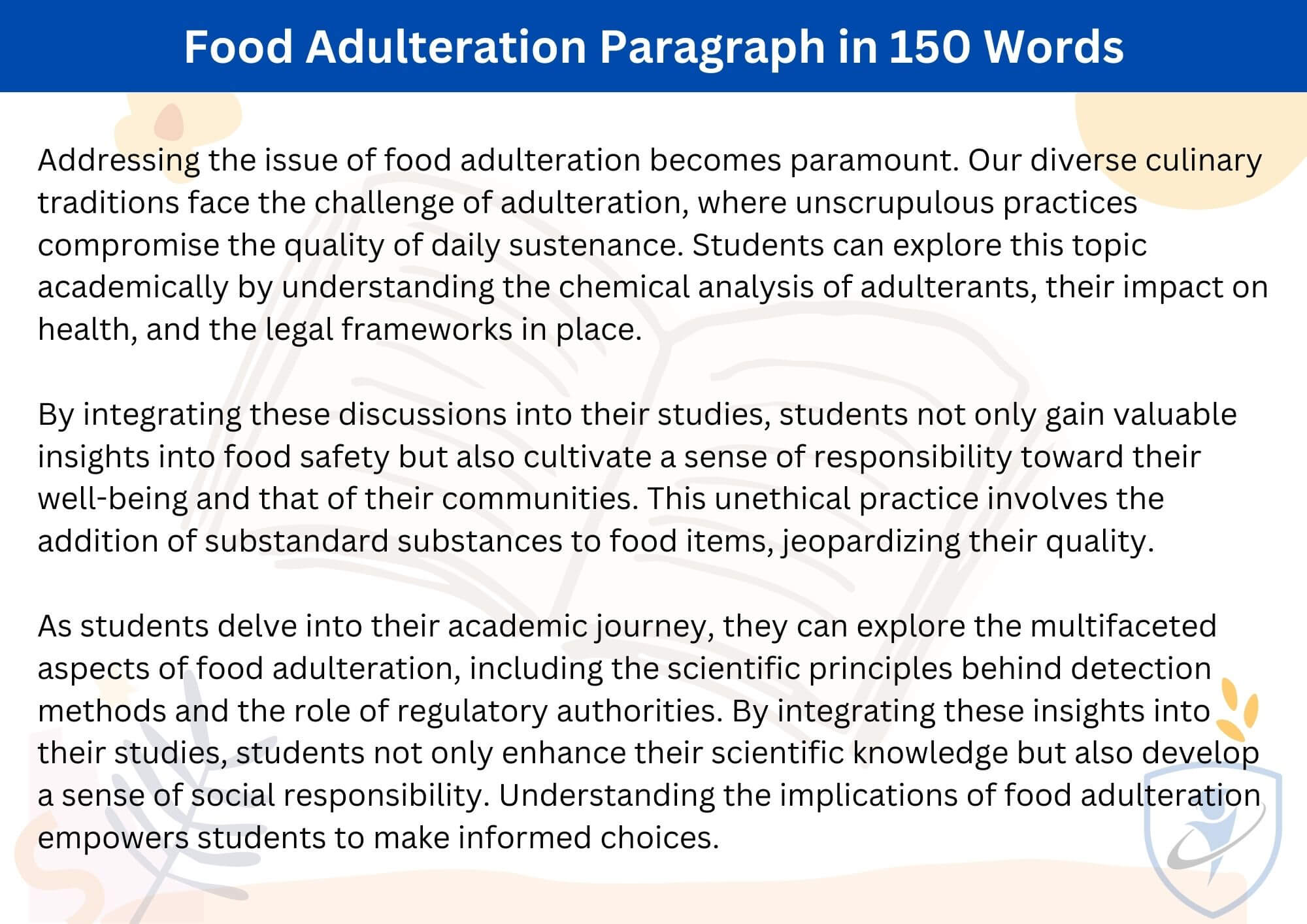Food Adulteration Paragraph
Food Adulteration Paragraph in 100 Words for Underclass 5 students
Beyond being a threat to personal well-being, food adulteration significantly intersects with academic pursuits. Consuming adulterated food can lead to health issues that may hinder cognitive functions, directly impacting people’s life performance.
To address this concern academically, Scientists can delve into the scientific intricacies of food adulteration. This involves understanding the various methods employed to detect adulterants and exploring the role of regulatory bodies in maintaining stringent food safety standards. Exploring the chemical analysis of adulterants provides insights into how unscrupulous practices compromise the integrity of food products.
Additionally, a comprehensive study should include an examination of the socio-economic factors contributing to the prevalence of food adulteration. This encompasses the economic pressures faced by producers and the societal challenges that contribute to unethical practices. By comprehensively understanding these aspects, students gain a holistic perspective on the issue.
Integrating discussions on food adulteration into their studies not only enhances students’ scientific knowledge but also instills a sense of responsibility toward societal well-being. Empowered with this knowledge, students can become advocates for change, fostering a culture of food safety in their communities. This academic exploration not only aligns with the pursuit of knowledge but also equips students with practical insights that can have a positive impact on their daily lives and the well-being of those around them.
Integrating these discussions into their studies empowers students with practical insights. They become not only informed consumers but also advocates for change, fostering a culture of food safety in their communities. This academic exploration aligns with the pursuit of knowledge, providing students with a valuable foundation for making informed choices and contributing to the well-being of society.
To engage with this issue academically, students can explore the scientific intricacies of food adulteration. This includes an in-depth understanding of the various methods employed for detecting adulterants, shedding light on the complexity of ensuring food safety. Additionally, students should delve into the regulatory framework in place, examining how authorities work to maintain the integrity of the food supply chain in the world
A comprehensive study should also encompass an analysis of the socio-economic factors contributing to the prevalence of food adulteration. This involves understanding the economic pressures faced by producers and the societal challenges that lead to unethical practices. By examining these factors, students gain a holistic perspective on the issue, recognizing the interconnectedness of various elements contributing to the problem.Consumers can protect themselves by being vigilant and informed. Checking food labels, buying from reputable sources, and staying aware of common adulterants are essential practices. Supporting and advocating for stringent food safety regulations also contribute to a safer food supply.
Consuming adulterated food can have detrimental effects on health, leading to various illnesses and long-term health issues. Adulterants may include toxic chemicals, contaminants, or substances that can cause allergies, posing a significant threat to overall well-being. Empowered with food adulteration knowledge, people can make informed choices regarding the food they consume, contributing to a healthier lifestyle for themselves and their communities. Moreover, this academic exploration aligns with the broader goal of fostering responsible citizens who actively contribute to societal well-being.
More Paragraphs:
| Paragraph On Morning Walk. |
| Environment Pollution Paragraph. |
| Online Classes And Traditional. |
| Health Is Wealth Paragraph. |
| Global Warming Paragraph. |

Frequently Asked Questions For Food Adulteration Paragraph
Q: What is food adulteration?
Answer: Food adulteration refers to the practice of adding inferior, harmful, or unauthorized substances to food items, compromising their quality, safety, and nutritional value. This unethical practice poses serious health risks to consumers.
Q: How does food adulteration affect health?
Answer: Consuming adulterated food can have detrimental effects on health, leading to various illnesses and long-term health issues. Adulterants may include toxic chemicals, contaminants, or substances that can cause allergies, posing a significant threat to overall well-being.
Q: Why is food adulteration a concern?
Answer: Food adulteration is a prevalent concern in the world due to its diverse culinary traditions and the complex nature of the food supply chain. Economic pressures, lack of stringent regulations, and insufficient monitoring contribute to the widespread occurrence of adulteration in various food products.
Q: What are the common methods of detecting food adulteration?
Answer: Various scientific methods are employed to detect food adulteration, including chemical analysis, spectroscopy, chromatography, and DNA testing. These techniques help identify the presence of adulterants and ensure the integrity of food products.
Q: What role can students play in addressing food adulteration?
Answer: Consumers can protect themselves by being vigilant and informed. Checking food labels, buying from reputable sources, and staying aware of common adulterants are essential practices. Supporting and advocating for stringent food safety regulations also contribute to a safer food supply.
Q: How can consumers protect themselves from food adulteration?
Answer: Students can play a crucial role in addressing food adulteration by integrating the topic into their academic studies. Understanding the scientific aspects, advocating for stricter regulations, and raising awareness in their communities contribute to building a culture of food safety and responsible consumption.

